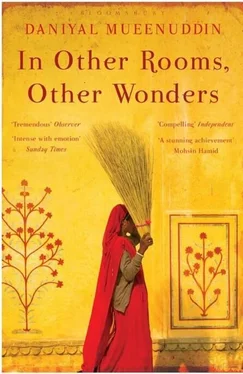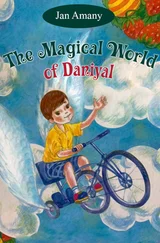A man stepped from behind one of the pillars, waving a flashlight down at the ground, motioning Nawab to stop.
‘Brother,’ said the man, over the puttering engine, ‘give me a ride into town. I’ve got business, and I’m late.’
Strange business at this time of night, thought Nawab, the taillight of the motorcycle casting a reddish glow around them on the ground. They were far from any dwellings. A mile away, the little village of Dashtian crouched beside the road — before that nothing. He looked into the man’s face.
‘Where are you from?’ The man looked straight back at him, his face pinched and therefore overstated, but unflinching.
‘From Kashmor. Please, you’re the first person to come by for over an hour. I’ve walked all day.’
Kashmor, thought Nawab. From the poor country across the river. Each year those tribes came to pick the mangoes at Dunyapur and other nearby farms, working for almost nothing, let go as soon as the harvest thinned. The men would give a feast, a thin feast, at the end of the season, a hundred or more going shares to buy a buffalo. Nawab had been several times, and been treated as if he were honoring them, sitting with them and eating the salty rice flecked with bits of meat.
He grinned at the man, gesturing with his chin to the seat behind him. ‘All right then, get in back.’
Balancing against the dead weight behind him, which made driving along the rutted canal path difficult, Nawab pushed on, under the rosewood trees.
Half a mile down the road, he shouted into Nawab’s ear, ‘Stop!’
‘What’s wrong?’ Nawab couldn’t hear over the rushing wind.
The man jabbed something hard into his ribs.
‘I’ve got a gun, I’ll shoot you.’
Panicked, Nawab skidded to a stop and jumped to one side, pushing the motorcycle away from him, so that it tipped over, knocking the robber to the ground. The carburetor float hung open and the engine raced for a minute, the wheel jerking, until the float chamber drained, and then it sputtered and died.
‘What are you doing?’ babbled Nawab.
‘I’ll shoot you if you don’t get away,’ said the robber, on one knee, the gun pointed.
They stood obscured in the sudden woolly dark, next to the fallen motorcycle, which leaked raw-smelling gasoline into the dust underfoot. Water running through the reeds in the canal next to them made soft gulping sounds as it swirled along. When his eyes adjusted Nawab saw the man sucking at a cut on his palm, the gun in his other hand.
When the man went to pick up the bike, Nawab came and touched him on the shoulder.
‘I told you, I’ll shoot you.’
Nawab put his hands together in supplication. ‘I beg you, I’ve got little girls, thirteen children. I promise, thirteen. I tried to help you. I’ll drive you to Firoza, and I won’t tell anyone. Don’t take the bike, it’s my daily bread. I’m a man like you, poor as you.’
‘Shut up.’
Without thinking, Nawab lunged for the gun, but missed.
Dropping the motorcycle, the man stepped back and shot him in the groin.
Nawab fell to the ground, holding the place where it hurt with both hands, entirely surprised, shocked, as if the man had slapped him for no reason.
The man dragged the bike away from the fallen body, stood it up, and straddled it, trying to start it. It had flooded, and not owning a motorcycle, he didn’t know what to do. He held the throttle wide open, which made it worse. At the sound of the shot the dogs in Dashtian had begun to bark, the sound fitful in the breeze.
Nawab, lying on the ground, at first thought the man had killed him. The pale moonlit sky tilted back and forth, seen through the branches of a rosewood tree, like a bowl of swaying water. He had fallen with one leg bent under him, and now he straightened it. His hand came away sticky when he felt the wound. ‘O God, O mother, O God,’ he moaned, not very loudly, in a singsong voice. He looked at the man with his back turned, vulnerable, kicking wildly at the starter, not six feet away. Nawab couldn’t let him get away with this. The bike belonged to him.
He stood up again and stumbled toward the motorcycle, tackled the thief, fell on him, pushing him to the ground. The man rolled over, kicked Nawab, and stood up.
Holding the gun away at arm’s length, he fired five more times, one two three four five, with Nawab looking up into his face, unbelieving, seeing the repeated flame in the revolver’s mouth. The man had never used weapons, had only fired this unlicensed revolver one time, to try it out when he bought it from a bootlegger. He couldn’t bear to point at the body or head, but shot at the groin and legs. The last two bullets missed wildly, throwing up dirt in the road. Again the robber stood the motorcycle up, pushed it twenty feet, panting, and then tried to start it. From Dashtian a torch jogged quickly down the road. Dropping the bike, the man ran into a little stand of reeds by the side of a watercourse.
Nawab lay in the road, not wanting to move. When he first got shot it didn’t hurt so much as sting, but now the pain grew worse. The blood felt warm in his pants.
It seemed very peaceful. In the distance, the dogs kept barking, and all around the crickets called, so many of them that they made a single gentle blended sound. In a mango orchard across the canal some crows began cawing, and he wondered why they were calling at night. Maybe a snake up in the tree, in the nest. Fresh fish from the spring floods of the Indus had just come onto the market, and he kept remembering that he had wanted to buy some for dinner, perhaps the next night. As the pain grew worse he thought of that, the smell of frying fish.
Two men from the village came running up, panting.
‘O God, they’ve killed him. Who is it?’
The other man kneeled down next to the body. ‘It’s Nawab, the electrician, from Dunyapur.’
‘I’m not dead,’ said Nawab insistently, without raising his head. ‘The bastard’s right there in those reeds.’
One of the men had a single-barreled shotgun. Stepping forward, aiming into the center of the clump, he fired, reloaded, and fired again. Nothing moved among the green leafy stalks, which were head-high and surmounted with feathers of seed.
‘He’s gone,’ said the one who sat by Nawab, holding his arm.
The man with the shotgun again loaded and walked carefully forward, holding the gun to his shoulder. Something moved, and he fired. The robber fell forward into the open ground. He called, ‘Mother, help me,’ and got up on his knees, holding his hands to his waist. The gunman walked up to him, hit him once in the middle of the back with the butt of the gun, and then threw down the gun and dragged him roughly by his collar onto the road. Raising the bloody shirt, he saw that the robber had taken half a dozen buckshot pellets in the stomach, black angry holes seeping blood in the light of the torch. The robber kept spitting, without any force.
The other villager, who had been watching, started the motorcycle by pushing it down the road with the gear engaged, until the engine came to life. Shouting that he would get some transport, he raced off, and Nawab minded that the man in his hurry shifted without using the clutch.
‘Do you want a cigarette, Uncle?’ the villager said to Nawab, offering the pack.
Nawab rolled his head back and forth. ‘Fuck, look at me.’
The lights of a pickup materialized at the headworks and bounced wildly down the road. The driver and the other two lifted Nawab and the robber into the back and took them to Firoza, to a little private clinic there, run by a mere pharmacist, who nevertheless kept a huge clientele because of his abrupt and sure manner and his success at healing with the same few medicines the prevalent diseases.
Читать дальше












